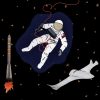While much of the city was preparing for Halloween, Portland State’s engineering students and space enthusiasts met at the Maseeh College of Engineering and Computer Science to discuss, lecture and share the latest ideas and topics in aerospace.
The Aerospace Expo brought together the Pacific Northwest aerospace community in a hybrid setting where more people attended online than in person, given it was a rainy Saturday in Portland. The event highlighted new and upcoming projects and updates on previous projects such as OreSat, Oregon’s first satellite launch, previously covered by the Portland State Vanguard.
“A student-run event like that… it was crisp, it was well done,” said Stuart McClung, Program Planning and Control Office chief of staff for the Orion program at NASA’s Johnson Space Center. “Hybrid stuff is tricky to do between having people in person and folks online, being able just to handle the logistics and getting all that executed, I thought that went really smooth.”
McClung, who was a keynote speaker at the Aerospace Expo, described his personal work, highlighting how working in the aerospace field has impacted his life and career. “Through circumstances, I ended up with the opportunity to work in aerospace and then in human space flight,” he said. “There’s an astronaut up in orbit somewhere taking advantage and using a piece of system or a piece of hardware that I helped build. There’s this thing that kinda hooks you in your soul, that says ‘I want more of that.’”
“Pick airplanes,” McClung continued. “Aircraft work is really cool, but you don’t necessarily know who’s flying in your airplane. All of a sudden you get these things that are usually the hardware that you had something to do with… it’s one of the really interesting things about working at NASA. Depending on your job, you get that very personal connection.”
McClung is currently working on a program to return to the moon titled Artemis. The first planned launch is a test flight with no crew members on board. “We’re getting ready to launch again… we’re going back out onto the moon,” McClung said. “The big purpose of Artemis… is to take humans back to the surface of the moon including the first female and then the first person of color… we’re going back but we’re also doing it differently. That’s really an exciting aspect of what the program’s about.”
The Aerospace Expo also featured a comprehensive group of speakers who provided a space for newbies and experts in the field to explore and learn about what’s new in the aerospace scene. “I also thought that the variety of speakers was good,” McClung said. “You know, you had a good mix of folks with all kinds of different levels of back-end experience and different backgrounds and different company structures.”
The audience of attendees also reflected this diversity of talent, further highlighting an eclectic engineering community.
“It’s a very interesting field,” said Dayana Murphy, a PSU electrical engineering major who attended the event. “I think that you’ll find that within aerospace there’s people from a diverse set of backgrounds like people from business school, people from mechanical engineering, we have people from graphic design… it’s all over the place, everybody is needed in aerospace.”
The event not only educated, but provided a foundation for those who are unfamiliar with aerospace and are simply curious about it. “I think they provide a really good avenue—whether they’re remote, hybrid or in person—for sort of an informal, good exchange of ideas,” McClung said. “The aerospace society there, just from my observation, looks like a really good group—if you got particularly a new student that might be interested in it, it’s a good avenue for them to see what this team’s doing and really find out if that’s what their interests are.”
If there was one thing that was clear about the event, it was that one did not need to have an extensive, thorough background in the world of aerospace engineering to participate and contribute.
Part of the event’s purpose was to make aerospace understandable for people with non-STEM backgrounds, and for anyone wondering whether or not the content shared and lingo used within the aerospace community is digestible, McClung had this to add: “It’s funny, I’ve joked that one of the reasons I get to do events like this is that I’m an engineer that can talk in complete sentences.”
Additionally, the event underscored the importance of collaboration across disciplines.
“I think it’s important for people to know just how applicable aerospace is to other fields,” Murphy said. “I think that you can gain a lot from being in this program and learning to work with different people, and the skill sets that you can get doing that and the community—that’s worthwhile. I wish that more people took advantage of the program, that more people can join the community because I think that as we get more people from different backgrounds—even completely random unassociated backgrounds—those are the people that we need because those are the people that think differently.”
